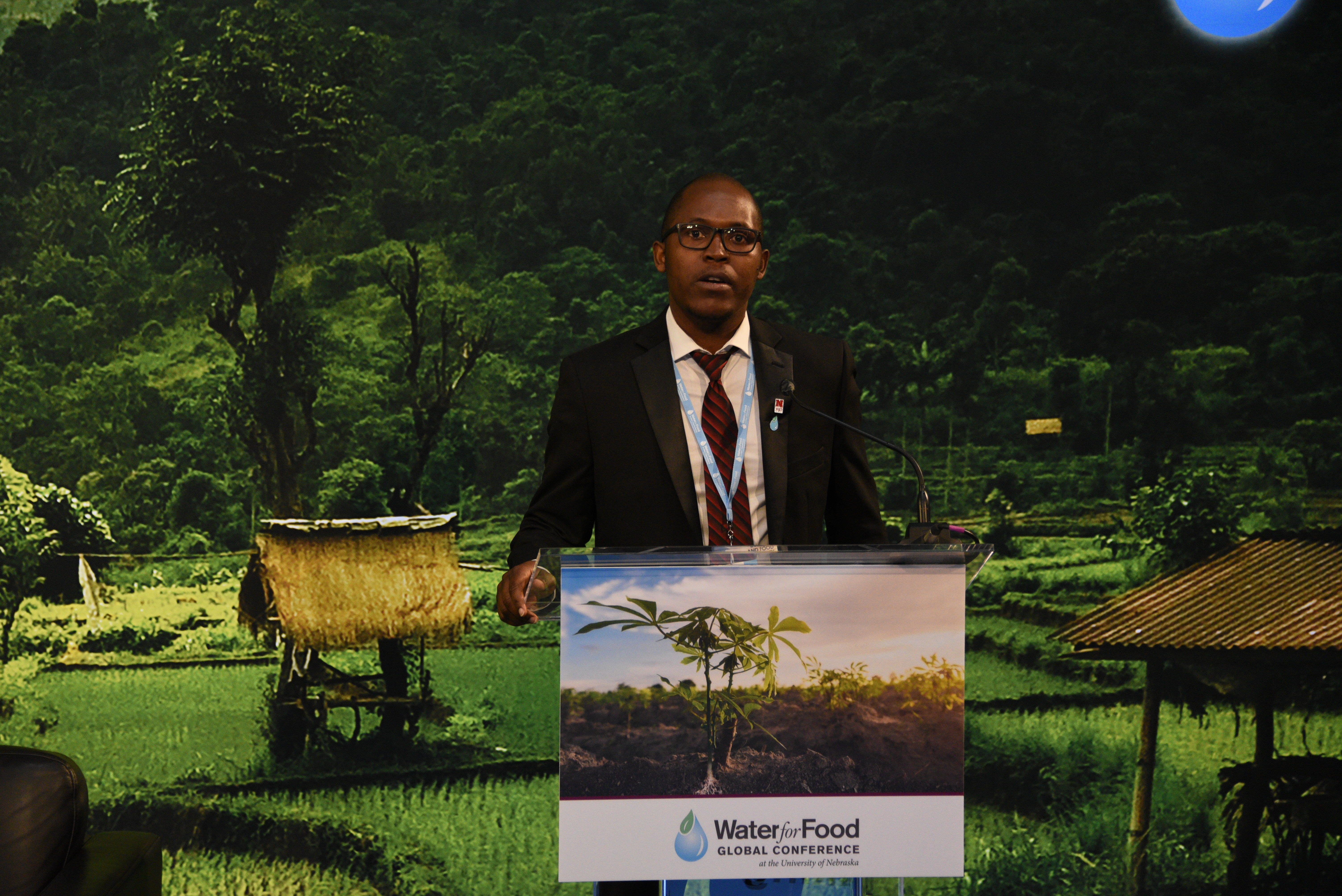This is a continuation of our "IANR is Global" series, which highlights the many ways internationalization is woven through the Institute of Agriculture and Natural Resources: through research collaboration, government and private industry partnerships, extension work, student educational experiences and beyond.
Sometimes a simple internet search can change a whole life trajectory. In the case of Mavuto Banda, it took him from Malawi to the Netherlands to Nebraska through a unique partnership between IHE Delft in the Netherlands, the University of Nebraska-Lincoln and the Daugherty Water for Food Global Institute (DWFI). Banda, who will graduate this weekend with a double master's degree from both institutions, presented about his international education path during DWFI's Water for Food Global Conference Tuesday (pictured above).
“This has been one of the best opportunities I’ve had. It’s changed the way I look at life, and the water issues that we face,” said Banda in his presentation. “I’ve come across people from more than 50 countries, made connections, shared ideas. Although we all face the problem of water, each part of the world needs a different approach, different solutions.”
Agriculture, especially smallholder farming, is the economic mainstay of Malawi, according to the International Food Policy Research Institute. While there has been rapid growth in the sector, the east African nation still faces challenges of food and nutrition insecurity.
“It’s ironic to see a country so rich in water resources, yet the population stills struggles with being able to use it. There is still such hunger,” said Banda in an interview. “If we were to only harness the water resources that we have, we have the potential to reduce Malawi's food insecurity. We can do more.”
Banda grew up helping his family in their garden, using buckets to draw water from the river some distance away to irrigate the plot that provided much of the food for their family. That led him to be interested in water and irrigation issues, which he pursued for his undergraduate degree at the University of Malawi. He then joined a sugar-production company as a farm manager responsible for water management for several years.
“I’m glad my path took me to study water and irrigation,” said Banda. “I don’t regret it because it’s proved to be a marketable career with potential to make a difference.”
He says he woke up one day wanting to go back to school. After a Google search into water-related programs, he stumbled across the double degree offering through Nebraska and IHE Delft in the Netherlands.
Also known as the Advanced Water Management for Food Production program, the partnership offers students the opportunity to study in Lincoln and Delft at two institutions known for their expertise in water and agriculture. Program participants complete six months of study at IHE Delft, then transition to Nebraska to complete the rest of their coursework, conduct field research and write their thesis, under the mentorship of advisers from both institutions. Banda is the fourth graduate of this double-degree program. The other three graduates have returned to their home countries, Tanzania, Guyana, and Zambia, and are all employed with organizations that work with agriculture and water issues.
After a few roadblocks in applying to the program and the help of a scholarship, Banda was finally accepted. Before he knew it, he was hastily getting together his documentation to head to the Netherlands for the first part of the program. While in Delft for his initial coursework, he met Dean Eisenhauer, former DWFI coordinator for the partnership with IHE Delft, and Derek Heeren, associate professor in the department of biological systems engineering and current coordinator, who would go on to be the adviser for Banda's research into the economic benefits of deficit irrigation in sugarcane farming. Eisenhauer and Heeren travel to Delft periodically to teach courses and plan partnership activities.
“Mavuto has a passion for irrigation, and for making a difference in his country. He is determined to contribute to a food secure society by establishing a consultancy firm and advocating for long-lasting solutions for crop production,"said Heeren. "He is a motivated and hardworking individual, and has shown resilience time and again through the challenges that come up during graduate school.”
Banda says he’s grateful for the many connections he’s made, the mentorship of his advisers, and for the support of the Ivanhoe Foundation and DWFI, which made it possible for him to undertake the program. After commencement excercises this weekend, he will officially have two degrees. From IHE Delft, he will have a master's in Water Science and Engineering with a specialization in Land and Water Development for Food Security. Nebraska will award a master's in Mechanized Systems Management, with a specialization in Advanced Water Management for Food Production.
His future goal is to set up a company of his own to help increase access to information about irrigation, agronomic practices and resource management to smallholder farms and other agricultural operations.
“We can do much better in Malawi,” he said. “I think entrepreneurship in this area can make an impact for people. When I go home, I want to start building that.”
---
For more information about the partnership between DWFI and IHE Delft, contact Derek Heeren at derek.heeren@unl.edu. Listen to Mavuto's presentation at the Water for Food Global Conference this week, courtesy of Ag NewsWire, here.
Do you have an international element to your work, studies, or background that you'd like to see highlighted in our "IANR is Global" Series? Contact Brianne Wolf at bwolf4@unl.edu.
